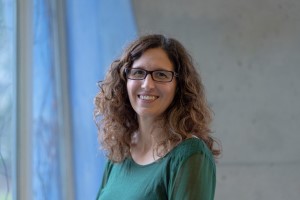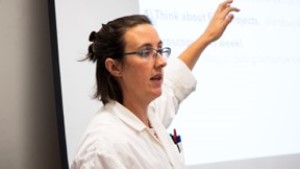Developing undergraduate STEM education by collaborating with students and teaching assistants
Wednesday 26 April 2023, 11.00AM
Using the student experience to identify hidden challenges and find new solutions
Dr. Cynthia E. Heiner

Freie Universität Berlin, Dahlem Center for Academic Teaching, Germany
What happens when we look at university teaching and learning from the perspective of students? What challenges are they facing that we might not be aware of? To answer these questions we brought students, lecturers and educational developers together to discuss discipline-specific challenges in teaching and learning. The co-creative process, inspired by design thinking [1], consisted of gaining student insights, jointly identifying learning challenges, and developing ‘prototype’ solutions.
In my talk, I will briefly introduce our design process using examples from two different subject areas. I will discuss our exploratory findings from looking at (i) the transition to university for STEM students, and (ii) the participatory redesign of an interdisciplinary curriculum. In both instances, the design process allowed teams of students and staff to identify new, hidden challenges and work together to propose original solutions to suit their context.
[1] Grabill, Jeffrey T., Sarah Gretter, and Erik Skogsberg. Design for change in higher education. JHU Press, 2022.
About the Speaker:
Cynthia Heiner earned her Bachelors Degree in Physics at the University of New Hampshire in 2002 and then moved to Berlin, Germany to continue her studies. After her Doctorate in experimental physics in 2009, she joined the University of British Columbia’s Science Education Initiative to pursue physics education research. She retuned to Europe in 2013 to help implement research-based pedagogies in science courses and advocate for change in the way teaching is valued within higher education structures. She is based at the Dahlem Center for Academic Teaching at the Free University of Berlin, but has also worked with teaching initiatives at Imperial College London and currently at the University of Leeds.
Helping graduate teaching assistants build skills and community: a no-budget, low-barrier approach
Dr. Megan Barker

Department of Biological Sciences, Simon Fraser University, Canada Teaching Assistants (TAs) are a cornerstone of many courses, but they often have little experience and a sense of isolation in their work. Supporting TAs' skill- and community-development is incredibly important, but has practical challenges. One approach to support TAs in their teaching is through reciprocal peer observation. This research study, designed with input from TAs, integrated peer observation and reflective practice directly into the role of TAs in a large first-year biology course. We'll discuss how this fostered community and confidence, while opening a door to evidence-based teaching approaches. More broadly, we’ll interactively consider how to meaningfully support graduate students’ pedagogical professional development in your own context.
About the Speaker:
Visiting from Vancouver Canada, Dr. Megan Barker is a faculty member in biology at Simon Fraser University where she teaches introductory biology and molecular biology courses. Following her graduate degree in structural biology, her postdoctoral fellowship focused on developing evidence-based teaching and learning approaches. Megan is currently a Visiting Fellow at the University of Cambridge, looking at commonalities and contrasts of student & instructor experiences at home and abroad. Her work includes classroom characterisation, teaching assistant professional development, course-based research experiences, and student learning of the language of science. Further, she is substantially involved in collegial support and curriculum development - and looking forward to potential collaborations with the University of York community!
Location: D/L/117
